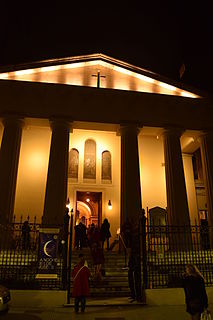The Scottish Episcopal Church is the ecclesiastical province of the Anglican Communion in Scotland.

The Continuing Anglican movement, also known as the Anglican Continuum, encompasses a number of Christian churches, principally based in North America, which have an Anglican identity and tradition but are not part of the Anglican Communion. These churches generally believe that traditional forms of Anglican faith and worship have been unacceptably revised or abandoned within some churches of the Anglican Communion but that they, the Continuing Anglicans, are preserving or "continuing" both Anglican lines of apostolic succession and historic Anglican belief and practice.
The Southern Episcopal Church was established in 1962 in reaction to liberal political and theological trends of the 1960s within the Episcopal Church USA. It was founded in Nashville, Tennessee, by a physician turned clergyman, Burnice Hoyle Webster, and a number of former members of the Episcopal Church USA. Webster became the SEC's first presiding bishop. The SEC now considers itself a "Continuing Anglican" church, but its members point out that the founding of the SEC preceded the start of the Continuing Anglican Movement by a decade and a half.
The Anglican Communion Network was a theologically conservative network of Anglican and Episcopalian dioceses and parishes in the United States working toward Anglican realignment. The Anglican Communion Network later developed into the Anglican Church in North America.

The history of the Anglican Communion may be attributed mainly to the worldwide spread of British culture associated with the British Empire. Among other things the Church of England spread around the world and, gradually developing autonomy in each region of the world, became the communion as it exists today.
The Reformed Episcopal Church (REC) is an Anglican church of evangelical Episcopalian heritage. It was founded in 1873 in New York City by George David Cummins, formerly a bishop of the Protestant Episcopal Church.

The Episcopal Diocese of Dallas is a diocese of the Episcopal Church which was formed on December 20, 1895, when the Missionary District of Northern Texas was granted diocesan status at the denomination's General Convention the preceding October. Alexander Charles Garrett, who had served as the first bishop of the Missionary District of Northern Texas, remained as bishop of the new diocese. The diocese began with thirteen parishes.

The Anglican Province of America (APA) is a Continuing Anglican church in the United States. The church was founded by former members of the Episcopal Church in the USA in order to follow what they consider to be a more truly Christian and Anglican tradition. It comprises three dioceses: Diocese of the Eastern United States (DEUS), Diocese of Mid-America (DMA), and the Diocese of the West (DOW). The combined dioceses total 60 congregations, with an estimated 6,000 members.

The Anglican Church of South America is the ecclesiastical province of the Anglican Communion that covers six dioceses in the countries of Argentina, Bolivia, Paraguay, Peru, and Uruguay.

The Anglican ministry is both the leadership and agency of Christian service in the Anglican Communion. "Ministry" commonly refers to the office of ordained clergy: the threefold order of bishops, priests and deacons. More accurately, Anglican ministry includes many laypeople who devote themselves to the ministry of the church, either individually or in lower/assisting offices such as lector, acolyte, sub-deacon, Eucharistic minister, cantor, musicians, parish secretary or assistant, warden, vestry member, etc. Ultimately, all baptized members of the church are considered to partake in the ministry of the Body of Christ.
The Anglican Episcopal Church (AEC) was a Continuing Anglican church consisting of parishes in Arizona, Alaska, and Florida served by a presiding bishop and several other clergy. The AEC was founded at St. George's Anglican Church in Ventura, California.

The history of the Episcopal Church in the United States of America has its origins in the Church of England, a church which stresses its continuity with the ancient Western church and claims to maintain apostolic succession. Its close links to the Crown led to its reorganization on an independent basis in the 1780s. In the nineteenth and early twentieth centuries, it was characterized sociologically by a disproportionately large number of high status Americans as well as English immigrants; for example, more than a quarter of all presidents of the United States have been Episcopalians. Although it was not among the leading participants of the abolitionist movement in the early 19th century, by the early 20th century its social engagement had increased to the point that it was an important participant in the Social Gospel movement, though it never provided much support for the Prohibitionist movement. Like other mainline churches in the United States, its membership decreased from the 1960s. This was also a period in which the church took a more open attitude on the role of women and toward homosexuality, while engaging in liturgical revision parallel to that of the Roman Catholic Church in the post Vatican II era.
The Anglican realignment is a movement among some Anglicans to align themselves under new or alternative oversight within or outside the Anglican Communion. This movement is primarily active in parts of the Episcopal Church in the United States and the Anglican Church of Canada. Two of the major events that contributed to the movement were the 2002 decision of the Diocese of New Westminster in Canada to authorise a rite of blessing for same-sex unions, and the nomination of two openly gay priests in 2003 to become bishops. Jeffrey John, an openly gay priest with a long-time partner, was appointed to be the next Bishop of Reading in the Church of England and the General Convention of the Episcopal Church ratified the election of Gene Robinson, an openly gay non-celibate man, as Bishop of New Hampshire. Jeffrey John ultimately declined the appointment due to pressure.

The Episcopal Diocese of Albany is a diocese of the Episcopal Church covering 19 counties in northeastern New York state. It was created in 1868 from a division of the Episcopal Diocese of New York.
James Parker Dees was the founder and first bishop of the Orthodox Anglican Church and the Orthodox Anglican Communion. Dees was born in Greenville, North Carolina on December 30, 1915, the son of James Earle Dees and Margaret Burgwin (Parker) Dees. He graduated in 1938 from the University of North Carolina at Chapel Hill with a Bachelor of Arts (BA) degree in political science and economics, then took a year of graduate study in international relations. From 1939 until 1942, he worked for the Atlantic Coast Line Railroad in Greenville, North Carolina. For two years after the Second World War, he was a baritone soloist with the New York Opera Company. He then studied at the Protestant Episcopal Church’s Virginia Theological Seminary for his Bachelor of Divinity degree, graduating in 1949. He was ordained as a deacon in the Episcopal Church on June 29, 1949; and as a priest by Thomas Henry Wright, Bishop of East Carolina, at the Church of the Holy Cross, in Aurora, North Carolina, on January 19, 1950. As a member of the Diocese of North Carolina, he served in charges in Aurora, Beaufort, and Statesville. His concerns about advancing liberalism caused him to withdraw from the denomination in 1963. Dees was discouraged from joining the Reformed Episcopal Church by fundamentalist leader Carl McIntire because of the REC's alleged association with groups perceived as being neo-evangelical. The decision to form a new jurisdiction was made. Dees founded the Anglican Orthodox Church on November 17, 1963 - the first religious body to withdraw from the PECUSA in the modern era. On Passion Sunday, March 15, 1964 Dees was consecrated a bishop by Wasyl Sawyna of the Holy Ukrainian Autocephalic Orthodox Church of North and South America, assisted by Orlando Jacques Woodward, a bishop of Old Catholic succession.

The United Episcopal Church of North America (UECNA) is an Anglican church that is part of the Continuing Anglican movement. It is not part of the Anglican Communion.

Anglican interest in ecumenical dialogue can be traced back to the time of the Reformation and dialogues with both Orthodox and Lutheran churches in the sixteenth century. In the nineteenth century, with the rise of the Oxford Movement, there arose greater concern for reunion of the churches of "Catholic confession". This desire to work towards full communion with other denominations led to the development of the Chicago-Lambeth Quadrilateral, approved by the Third Lambeth Conference of 1888. The four points were stipulated as the basis for church unity, "a basis on which approach may be by God's blessing made towards Home Reunion":

The Anglican Church in North America (ACNA) is a Christian denomination in the Anglican tradition in the United States and Canada. It also includes ten congregations in Mexico, two mission churches in Guatemala, and a missionary diocese in Cuba. Headquartered in Ambridge, Pennsylvania, the church reported 30 dioceses and 1,037 congregations serving an estimated membership of 134,593 in 2017. In 2020, the denomination reported 972 congregations and 126,760 members. The first archbishop of the ACNA was Robert Duncan, who was succeeded by Foley Beach in 2014.

William Howard Love was the ninth bishop of the Episcopal Diocese of Albany. He served as Bishop of Albany from 2007 until January 31, 2021. Love is known for his support for a traditional definition of marriage and for his opposition to the blessing of same-sex unions. In October 2020, Love was found to have violated Episcopal Church doctrine and rules due to his unwillingness to permit same-sex unions to be blessed by clergy within the Albany diocese. In response to that finding, Love resigned from his position as bishop on February 1, 2021. On March 29 of that year, Love was released and removed from the ordained ministry by Presiding Bishop Michael Curry at his own request.

The Episcopal Church (TEC), based in the United States with additional dioceses elsewhere, is a member church of the worldwide Anglican Communion. It is a mainline Christian denomination and is divided into nine provinces. The presiding bishop of the Episcopal Church is Michael Bruce Curry, the first African-American bishop to serve in that position.









